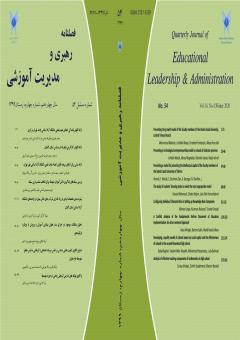Validation of research method curriculum model with emphasis on artistic research
Subject Areas :fatemeh Hosseini 1 , Seyede Esmat Rasooli 2 *
1 - PHD student of Curriculum Planning, Sari Branch, Islamic Azad University, Sari, Iran
2 -
Keywords: curriculum, pattern design, research method, artistic research, combined methods.,
Abstract :
Purpose: One of the most important elements of the university system are the curricula, which must be appropriate in line with the goals, tasks, and developments so that they can play their effective role. Art is one of the curriculum through which the aesthetic sense can be nurtured and developed in students. The purpose of this research was to validate the curriculum model of the research method with an emphasis on artistic research.
Method: The current research is descriptive-survey in terms of applied purpose, in terms of quantitative method. The research community consisted of all full-time faculty members and faculty members who taught the research method course in the academic year of 2014-2014. Therefore, the sample size was 84 people. The research tool was a researcher-made questionnaire. Also, for the validity of the findings, experts' opinions and validation were done using Cronbach's alpha method. Data analysis was done using confirmatory factor analysis and structural equation modeling.
Findings: The results showed that the curriculum model of the research method with an emphasis on artistic research includes dimensions (original thinking, communicative rationality, meaning-oriented thinking, critical thinking, aesthetic thinking, creative thinking, emerging thinking, intuitive thinking, systemic thinking, rational thinking , interdisciplinary thinking, interdisciplinary thinking). Also, the results showed that the proposed model had a good fit.
Conclusion: it can be said that the curriculum is the main axis of education based on which training is given; Therefore, the planners of the education system in the field of curriculum should pay more attention to the art component and allocate an important part of the curriculum to art research.
کبری قورتانی،داود؛ براتعلی،مریم؛ دوازده امامی،حمید(1402). «طراحی و اعتباریابی الگوي برنامه درسی هنرهاي تعاملی بر اساس عناصر کلاین»،فصلنامه علمی-پژوهشی رهبری و مدیریت آموزشی، سال هفدهم، شماره ،1 بهار،صص 296-276.
جاویدی کلاته جعفرآبادی،طاهره؛ عبدلی، افسانه(1396). زیباییشناسی و هنر از دیدگاه ماکسین گرین و اشارات تربیتی آن. رویکردهای نوین آموزشی. 12 (2). 45-21.
حبیب نژاد، آرزو و نورآبادی، سولماز(1398).«بررسی و تحلیل وضع موجود و مطلوب برنامه درسی درس روشهای تحقیق در نظام دانشگاهی کشور»،جمین همایش ملی پژوهشهای نوین در برنامه ریزی درسی ایران،تهران
رضایی، منیره(1392). تربیت هنری در نظام آموزشی ایران. نشریه مطالعات فرهنگ- ارتباطات. سال چهاردهم، شماره بیست و دوم. 29-7.
طهماسب زاده شیخلار،داود و علم الهدی، جمیله، (1394)،تربیت زیبایی شناختی: رهیافتی جامع برای چالش های برنامه درسی،کنفرانس بین المللی علوم انسانی، روانشناسی و علوم اجتماعی،تهران
گرمابی،حسنعلی؛ ملکی، حسن؛ بهشتی، سعید افهمی؛رضا(1394). بازشناسی مؤلفههای زیباییشناسی و هنر برای برنامه درسی از منظر منابع مکتوب و دیدگاه صاحبنظران. مطالعات برنامه درسی. 10(39). 70-49.
مهر محمدی، محمود. (1390). تبیین چرخش زیباشناسانه در تعلیم و تربیت: درسهای خرد و کلان برای بهبود کیفیت آموزش با الهام از عالم هنر. نشریه تعلیم و تربیت، 1 (105).52-30.
میرعارفی،فاطمهسادات؛ مهرمحمدی،محمود؛ علی عسگری،مجید؛حاجیحسیننژاد،غلامرضا(1398).طراحی و اعتبار بخشی برنامه درسی درس «رویکرد زیباییشناسانه به تدریس» در تربیتمعلم. مطالعات برنامه درسی. 15(54). 116-76
Al Mansoor, M., Alhosani, M., AlArabi, K., Alsalhi, N. R., & Alkhalaileh, M. (2023). Perspectives of UAE Secondary Art Teachers on the Implementation of a New Art Curriculum. Eurasian Journal of Educational Research, 103(103), 106-124.
Baden, M. S., & Wimpenny, K. (2014). A practical guide to arts-related research. Springer.
Borgdorff, H. (2010). The production of knowledge in artistic research. In The Routledge companion to research in the arts (pp. 44-63). Routledge.
Borgdorff, H., Peters, P., & Pinch, T. (2019). Dialogues between artistic research and science and technology studies: an introduction. In Dialogues Between Artistic Research and Science and Technology Studies (pp. 1-15). Routledge
Cahnmann-Taylor, M. (2013). Arts-based research: Histories and new directions. In Arts-based research in education (pp. 21-33). Routledge.
Dombois, F. (2019). Art with Some T. Between/Beyond/Hybrid. New Essays on Transdisciplinarity, 53-70.
Forde, S. D. (2022). Drawing your way into ethnographic research: comics and drawing as arts-based methodology. Qualitative Research in Sport, Exercise and Health, 14(4), 648-667.
Griffin, G. (2012). Writing about research methods in the arts and humanities. In Theories and methodologies in postgraduate feminist research (pp. 91-104). Routledge.
Huber, A., Ingrisch, D., Kaufmann, T., Kretz, J., Schröder, G., & Zembylas, T. (2021). Knowing in performing: Artistic research in music and the performing arts (p. 228). transcript Verlag.
Jokela, T., Hiltunen, M., & Härkönen, E. (2015). Art-based action research–participatory art for the north. International Journal of Education through Art, 11(3), 433-448.
Lutters, J. ( 2015). Research-based Art. Een nieuwe grondslag voor een opleiding tot artist educator. Cultuur+ Educatie, 15(43), 63-7.
Niedderer, K., & Reilly, L. (2010). Research practice in art and design: Experiential knowledge and organised inquiry. Journal of Research Practice, 6(2), E2-E2.
Rolling Jr, J. H. (2010). A paradigm analysis of arts-based research and implications for education. Studies in art education, 51(2), 102-114.
Serig, D. (2012). Doing Artistic Research. Research Review. Teaching Artist Journal, 10(2), 121-129.
Shields, S. S., & Fendler, R. (2023). Developing a Curriculum Model for Civically Engaged Art Education: Engaging Youth Through Artistic Research. Routledge.
Smithbell, P. (2010). Arts-based research in education: A review. The Qualitative Report, 15(6), 1597-1601.
Swanzy‐Impraim, E., Morris, J. E., Lummis, G. W., & Jones, A. (2023). Exploring creative pedagogical practices in secondary visual arts programmes in Ghana. The Curriculum Journal, 34(4), 558-577.
Wang, Q., Coemans, S., Siegesmund, R., & Hannes, K. (2017). Arts-based methods in socially engaged research practice: A classification framework. Art/Research International: A Transdisciplinary Journal, 2(2), 5-39.
Wagner, C., Garner, M., & Kawulich, B. (2011). The state of the art of teaching research methods in the social sciences: Towards a pedagogical culture. Studies in higher education, 36(1), 75-88.

